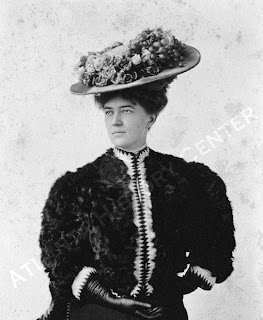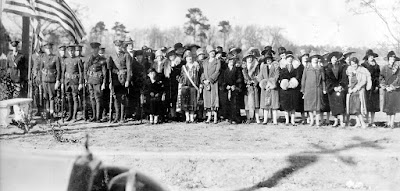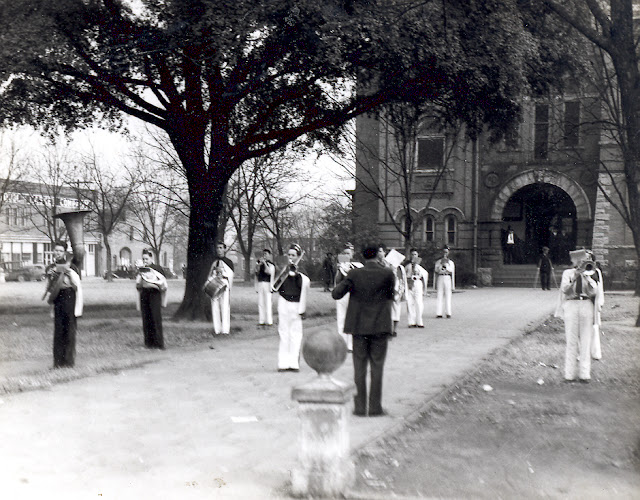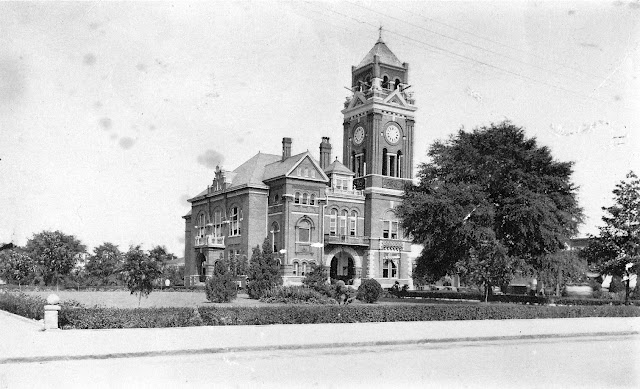Linnie Futrelle never got over the news she received in her home in Adrian, Georgia, that her son Jacques was one of the 1517 souls who perished early in the morning of April 15, 1912. Futrelle and his wife May were cruising across the Atlantic Ocean aboard the unsinkable queen of the White Star Line. His mortal remains lie on the ocean floor among the layers of rock, silt, and the deteriorating hull of the world's most famous luxury liner, the H.M.S. Titanic.

His grieving mother, seeking closure to the death of her son, caused a marker to be erected to commemorate his tragic and noble death. You may have driven by the marker many times and never noticed it. This is the story of a man whose cenotaph stands in the cemetery of Poplar Springs Methodist Church, just east of Scott, Georgia. The marker reads, "Jacques, son of W.H.H. & Linnie Futrelle, Apr. 9, 1875, Lost on Titanic, Apr. 15. 1912, Who in the supreme test, proved himself. Nearly fifteen weeks later on July 28, 1912, Linnie Futrelle passed away into Heaven to rejoin her son.
Jacques Heath Futrelle, a native of Pike County, Georgia, grew up to appreciate literature. Jacques worked first as a printer's devil and then as Business Manager of the Atlanta Journal. He oversaw the establishment of the first sports department of the Journal. After his return to Atlanta, Jacques took the hand of the love of his life, the beautiful Lillie May Peel, in marriage on July 17, 1895. The Futrelles moved to New York, where Jacques became the telegraph editor of the New York Herald.
Futrelle left journalism to manage a theater in Richmond, Virginia. He began to write, direct, and act in plays for a couple of years before returning to Boston to work for the icon of newspaper publishers, William Randolph Hearst. What Jacques enjoyed most was writing - in particular, mysteries. His most famous work, "The Thinking Machine," was first published as a serial in "The Boston American." Futrelle is most remembered for his character of Professor S.F.X. Van Dusen, who was "The Thinking Machine." Professor Van Dusen's most well read case was "The Problem of Cell 13." Jacques wrote more than a dozen novels and even more magazine articles for leading magazines of the day, including The Saturday Evening Post.

In January 1912, the Futrelles traveled to Europe to promote Jacques' novels and to give him a change of scenery to write even more magazine articles. After, their vacation was cut short, the Futrelles gathered with friends to celebrate Jacques' 37th birthday before setting sail for the return trip to America the next day. Futrelle (LEFT) never made it to bed that night, but was on time to board the world's greatest luxury liner on her maiden voyage. The H.M.S. Titanic was the pride of the White Star Line. She was considered to be unsinkable, the best passenger ship in the history of the World. He had just finished his last work, "My Lady's Garter."
As the ship steamed toward home, all was well. After a lavish dinner, the wealthy men aboard milled around talking about the issues of the day, the upcoming presidential election, the troubles in Europe, and so forth. Suddenly and without a solitary hint of a warning, the unthinkable happened. The ship struck an iceberg, which tore into her hull. Passengers felt a jolt, but were oblivious to their impending fate. Jacques and May were in their state room when they felt a slight concussion. Jacques had been complaining of a headache. May was reading a book. Presuming it to be a "baby iceberg," Jacques reassured May, "Oh, I guess it's nothing." May wasn't as positive. She ordered Jacques to go out to ascertain the true extent of what was happening. Within a few minutes, Jacques returned to inform her of the situation, which he believed to be of little consequence. A few minutes later, stewards knocked on the door with the grave news, the unsinkable ship was sinking. The couple got fully dressed and put on their ship supplied life jackets.

Jacques escorted May (LEFT) to the lifeboat section, pleading for her to get aboard. She refused. Jacques coaxed her into the boat with the assurance that he would come along later in another boat, ignorant of the fact that there would not be enough lifeboats aboard to handle all of the passengers and crew. At the moment her lifeboat was about to be lowered into the water, May jumped out to find Jacques. May found Jacques down below the deck. He was standing with a group of gentlemen, who appeared unconcerned with their destiny. May and Jacques embraced for the final time. Jacques escorted May back to the life boats. He told her to think of the children. He convinced May that once the ship went underwater, that he could survive by clinging to the side of a life boat. May hesitated. The boat was about to leave the deck. Jacques screamed out, "For God's sake, go! It's your last chance, go!" May still lingered in anguish on the edge of the boat. An officer pushed her into the boat and to safety.
At that instant, May knew that she would never see Jacques alive again. May wrote, "The last I saw of my husband, he was standing beside Colonel John Jacob Astor. He had a cigarette in his mouth. As I watched him, he lit a match and held it in his cupped hands before his face. By its light I could see his eyes roam anxiously over the water. Then he dropped his head toward his hand and lit his cigarette. I know those hands never trembled." May wondered why there were fifty-one open places in the sixty-five man lifeboat. May survived the horror of that night, but her thoughts of Jacques standing on the deck never faded from her mind.









